
Youth
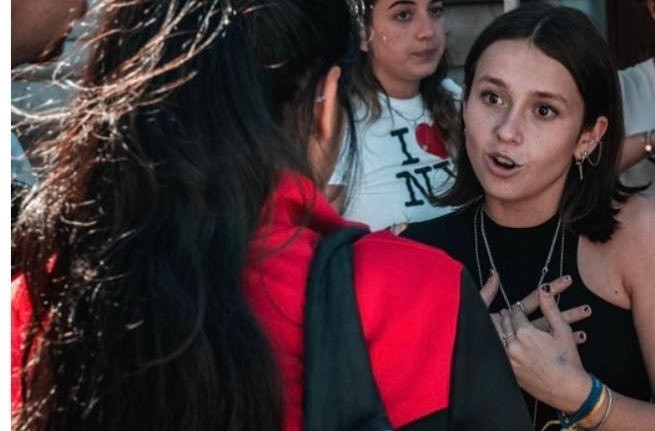
Women lead charge of Jewish students on campus
The South African Union of Jewish Students (SAUJS) this year is predominantly led by passionate and committed young women.
Sasha Said is SAUJS national chairperson; Ruby Kurgan chairperson of Stellenbosch University (SU); Amy Snaid represents the University of Johannesburg; Rachel Segal is now leading SAUJS at the University of Cape Town (UCT); and Shira Bome is representing all Jewish youth at private universities. There’s a sprinkling of young men at the helm, with Jacob Boner chairing SAUJS at the University of the Witwatersrand (Wits), and Jodan Sweidan in the hotseat at Pretoria University, but five out of seven top positions are held by women. The SA Jewish Report spoke to these female powerhouses about the upcoming year.
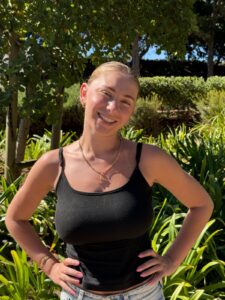

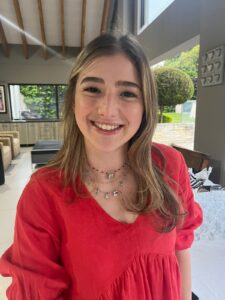
Said, an alumnus of King David Linksfield who is doing a double major at the University of Pretoria, said she hit the ground running this year to ensure that SAUJS empowered, protected, and nurtured Jewish life on university campuses around South Africa.
Through co-ordinating events, fighting antisemitism, and promoting Jewish life, SAUJS provides a space on campus for young Jews to explore and express their Jewish identities safely, she said.
The five women have put themselves in the frontline. Universities, as a rule, are hotbeds for radical advocacy, especially during the annual Israeli Apartheid Week (IAW) on campuses around the world.
Though from a Jewish perspective, the week is an opportunity for constructive dialogue and freedom to express one’s viewpoint, since 7 October 2023, demonstrations have been rife with antisemitic retaliation and intimidation.
It now rarely allows for productive conversation, as has been seen on campuses around the world. In the United States, universities last May were preoccupied by large-scale pro-Palestinian protests. Students demanded divestment from Israel by demonstrating and camping out on campus for weeks on end. Encampments on campuses in solidarity with Gaza resulted in outbreaks of violence and arrests. In South Africa, however, though anti-Israel protesters did create encampments, there was little disturbance at Wits or UCT.
UCT SAUJS experienced the brunt of the IAW protests in South Africa. Its stand was surrounded by volatile students claiming to be Palestinian advocates, who used it as a platform to hurl antisemitic remarks at fellow Jewish students and further intimidate them online.
Based on these international and local experiences, these women are taking a stand to ensure that Jews are able to express their Jewishness and are protected on campus against those with nefarious intent.
They are determined that no Jew will be targeted either for being a Zionist or for being Jewish. Said Segal, “I have had some uncomfortable conversations and experiences on campus,” but “my Jewish pride and passion for my community is stronger than any hostility that I may receive”.
SAUJS hopes to instil that sense of pride in all its Jewish students to ensure that uncomfortable conversations don’t leave them wounded but able to stand up for themselves and their heritage.
Though Jews have been ridiculed and suffered attempted “cancelling” by their classmates online and on UCT’s campus for being Jewish, SAUJS ensures that their voices are heard and their right to Jewish expression protected.
Young Jewish Witsies were ostracised from a student-fee march after it was hijacked by “campers” to boycott Israel. A lecturer was even captured on video intimidating Jewish students. SAUJS removed Jews from the protest and escalated the matter with Wits’ management.
Said said she was passionate about “creating an environment where our students feel supported in their identity and rights”. Alongside her “if not me, then who?” attitude, her desire to be proactive and not a passive observer and to “ensure that our community’s needs and voices are represented and heard” is what guides her as national chairperson in 2025.
Stellenbosch University has only recently opened a SAUJS space, and Kurgan says how “strange and ostracising” it was to arrive on campus without representation before this was the case. “It felt like we were left off the radar,” she says. Kurgan’s aim for the year is to “create the starting point for SAUJS to thrive at SU” through “fun environments where Jews can interact” and not to “feel threatened about our identity”.
“As Jews, we will never not have to stand up for ourselves, especially regarding Israel,” Kurgan says, but “university is the best time to get involved, educate ourselves, and make our presence known.” She also feels she has a responsibility to “educate” her fellow students and create “a good representation of Jews” with the goal of “changing minds about us”.
Segal believes that promoting Jewish life on campus “extends beyond our immediate community”. SAUJS UCT aims to “foster understanding and respect for Judaism within the broader UCT community by encouraging meaningful engagement, dialogue, and education”, she says. IAW at UCT was particularly ferocious last year, with Zionists being berated for being Jewish. By nurturing “unity” on campus where “diversity is celebrated” and “mutual respect flourishes”, Segal says she’s committed to challenging antisemitism by addressing it with “education and solidarity”.
Bome was compelled by the impact of the events of 7 October 2023 to take on leadership roles on campus as she saw “how much Jewish students needed support, advocacy, and a sense of community”. She couldn’t just sit back and do nothing for herself and other Jewish students. She recognised the challenge of Jewish students feeling unsupported, and if she can “make it just a little bit easier for everyone in this respect” then she wants “to be there to do that”, she says.
Snaid’s campus experience has been a “mix of rewarding and challenging” interactions. Though she enjoys sharing her heritage and culture with others, “there have been moments of misunderstanding or tension”, usually around “issues affecting the Jewish community”. These interactions have only reaffirmed her commitment to education, advocacy, and unity within the Jewish community on campus, Snaid says, and she hopes to promote mutual understanding by strengthening partnerships with other student organisations.
Said is proud that her leadership dismantles societal stigmas around women in leadership while ultimately tackling the task of what it means to be a Jewish leader in uncertain times.
SAUJS’s leadership is committed to its responsibility of “leading by example” and protecting Jews against antisemitism. Simply put, it’s about allowing Jews to wear their chai necklaces and kippot proudly on campus and engage in dialogue without feeling threatened as SAUJS provides a sense of security and community.





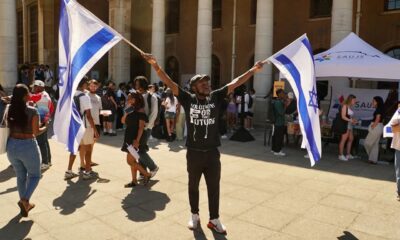

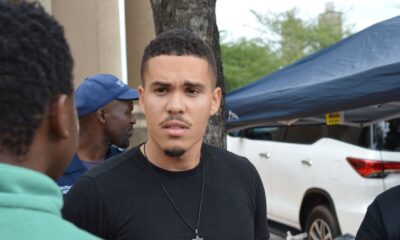



Erin Dodo
February 25, 2025 at 9:58 am
Go girls go!